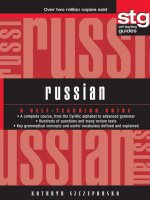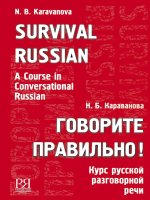russian a self-teaching guide
Bạn đang xem bản rút gọn của tài liệu. Xem và tải ngay bản đầy đủ của tài liệu tại đây (2.24 MB, 313 trang )
Russian
A Self-Teaching Guide
Kathryn Szczepanska
John Wiley & Sons, Inc.
Copyright © 2005 by Kathryn Szczepanska. All rights reserved
Published by John Wiley & Sons, Inc., Hoboken, New Jersey
Published simultaneously in Canada
No part of this publication may be reproduced, stored in a retrieval system, or
transmitted in any form or by any means, electronic, mechanical, photocopying,
recording, scanning, or otherwise, except as permitted under Section 107 or 108 of the
1976 United States Copyright Act, without either the prior written permission of the
Publisher, or authorization through payment of the appropriate per-copy fee to the
Copyright Clearance Center, 222 Rosewood Drive, Danvers, MA 01923, (978) 750-8400,
fax (978) 646-8600, or on the web at www.copyright.com. Requests to the Publisher for
permission should be addressed to the Permissions Department, John Wiley & Sons,
Inc., 111 River Street, Hoboken, NJ 07030, (201) 748-6011, fax (201) 748-6008, or online
at />Limit of Liability/Disclaimer of Warranty: While the publisher and the author have used
their best efforts in preparing this book, they make no representations or warranties
with respect to the accuracy or completeness of the contents of this book and specifically
disclaim any implied warranties of merchantability or fitness for a particular purpose. No
warranty may be created or extended by sales representatives or written sales materials.
The advice and strategies contained herein may not be suitable for your situation. You
should consult with a professional where appropriate. Neither the publisher nor the
author shall be liable for any loss of profit or any other commercial damages, including
but not limited to special, incidental, consequential, or other damages.
For general information about our other products and services, please contact our
Customer Care Department within the United States at (800) 762-2974, outside the
United States at (317) 572-3993 or fax (317) 572-4002.
Wiley also publishes its books in a variety of electronic formats. Some content that
appears in print may not be available in electronic books. For more information about
Wiley products, visit our web site at www.wiley.com.
ISBN-13 978-0-471-26989-2 (paper)
ISBN-10 0-471-26989-1 (paper)
Printed in the United States of America
10987654321
In memory of
Bruce Everett Fritch
(1936–1985)
Contents
v
Acknowledgments vii
1 The Russian Alphabet 1
2 The Noun 14
3 The Accusative Case 38
4 The Adjective 57
5 The Verb 88
6 The Prepositional Case 98
7 Present Tense Verbs 115
8 The Dative Case 138
9 Aspect of Verbs 156
10 Future Tense and Imperative Mode 167
11 The Dative Case (continued) 178
12 The Genitive Case 188
13 The Genitive Plural 214
14 The Instrumental Case 236
15 Verbs of Motion 251
16 The Prepositional, Dative, and Instrumental Plural 271
17 Participles 280
Russian-English Vocabulary 299
vi
Acknowledgments
I hereby acknowledge publicly to my former professors at Stanford University—
Joseph A. Van Campen and Dina B. Crockett—that they were right about every-
thing. I am grateful to the editors at John Wiley & Sons for their unstinting
generosity of time and labor, especially to John Simko for his attention to detail,
Jeff Golick for his patience, and copy editor Dobrochna Dyrcz-Freeman for her
sharp eye and mind.To Stan and Nancy, the sine qua non of my existence, a big fat
punch in the nose. And to my Muse and herself a future author, Pamela Rose
Machado, thanks for keeping me up at all hours of the day and night, and for sim-
ply being you.
1
The Russian Alphabet
Русский алфавит
1
The Russian alphabet, also called Cyrillic, consists of thirty-three letters repre-
senting thirty-one sounds and two signs that have no phonetic value of their own.
It is attributed to the Greek monks Cyrill and Methodius, who came as mission-
aries to Christianize the Slavic countries and left their mark on the language as
well. Modified forms of this alphabet are still in use today in countries other than
Russia, including Bulgaria and some of the new nations of the former Yugoslavia.
Approximately one-third of the Cyrillic alphabet consists of letters that are
identical to the Roman alphabet, with a phonetic value that is either almost equal
or similar. Another third of the letters are recognizable to Westerners because of
their Greek origin: п is the Greek pi, р is the Greek rho, and so forth. The final
third consists of letters that were created to represent sounds in the Slavic lan-
guages that had no counterpart in the original Greek of the missionary monks.
Some of these letters have a Hebrew origin, such as the letter ш [sh].
1
Although there are visual and phonetic similarities, almost no Russian letter
is pronounced in quite the same way as its English counterpart. Russian vowels
are purer and more clear than English vowels, and, except for combinations with
the consonant-glide й, do not form diphthongs. Many Russian consonants form
“hard” and “soft” pairs, which are not easy to represent in English. Consonants
that are plosive in English (p, b, t, d) are not plosive in Russian, which makes their
1
Brackets will be used throughout the text to indicate pronunciation.
pronunciation for English speakers difficult. And last, the famous Russian frica-
tives ш [sh], ж [zh], ч [ch], щ [sh’], ц [ts] pose challenges all their own.
You will find a complete list of the Russian alphabet on page 13.
Sounds and Spelling
Vowels
There are ten Russian letters for five vowel sounds:
Hard Soft
Letter Pronunciation Letter Pronunciation
а a as in father я ya as in yard
э e as in fed е ye as in yet
ы i as in sit и ee as in feet
о o as in home ё yo as in yore
у oo as in food ю yu as in Yukon
The vowels in the first column are called hard and are written at the beginning of
a word and after hard consonants. The vowels in the second column are the soft
vowels. They are written after soft consonants and when the word begins with
an iotated vowel (the sound [y]). Compare the following: áлто (alto)—Ûлта
(Yalta); Эмñлия (Emilia)—Елéна (Yelena); Óльга (Olga)—ёжик (hedgehog);
Урáл (Urals)—Îрий (Yuri).The letters representing the sound [i] do not quite
fit this paradigm, since their pure sounds are not quite the same. Nonetheless,
they obey the rule above: the ы is written after hard consonants and the и after
soft consonants.
Consonants
Hard or Soft
Russian consonants may be either hard or soft.
2
Most English consonants are pro-
nounced with a hard articulation, but most Russian consonants can be pro-
nounced either way. By far the best example for English speakers of the
difference between a hard and a soft consonant is the Spanish consonant ñ and
the English letter n. The sound also occurs occasionally in English words, such as
2 RUSSIAN: A Self-Teaching Guide
2
They are also called palatalized and nonpalatalized.
onion and poignant. As a device to assist in the pronunciation of Russian soft con-
sonants, some textbooks suggest the insertion of the glide [y] between the conso-
nant and the following vowel so that a hard n plus a would be transcribed as [na]
and a soft n plus a as [nya]. This device is not quite correct, but it can be useful to
help the student achieve a correct pronunciation.
The following list of consonants shows the hard and soft pairs possible in
modern Russian. For ease in pronunciation, they are shown with the vowel letters
э and е.
Hard Soft Hard Soft
бэ бе нэ не
вэ ве пэ пе
гэ ге рэ ре
дэ де сэ се
зэ зе тэ те
кэ ке фэ фе
лэ ле хэ хе
мэ ме
There are six consonants in Russian that are either hard or soft, but not both.
The three always-hard consonants are ж [zh], ц [ts], and ш [sh]. No matter which
vowel follows them, they will always be pronounced hard. The three consonants
that are always pronounced soft are ч [ch], щ [sh’], and й ([y] as in boy). These
facts have various consequences for the writing system. None of these consonants
may be followed by the vowel ы (the vowel и is written instead). In addition, the
vowels я and ю appear as а and у. The result is the all-important seven-letter
spelling rule:
After the fricatives ж, ч, ш, щ, and the velars к, г, х, do not write ы, я, or
ю; instead, write и, а, or у.
The letter ц is not part of this spelling rule. The full explanation for this spelling
rule can be appreciated only with an understanding of the historical morphology
of Russian.
The pronunciations of the consonants ж, ч, ш, and щ differ from their
transliterated values [zh], [ch], [sh], and [sh’]. In fact, their articulation in terms of
hardness and softness is opposite to their sounds in English. In Russian, the con-
sonants ж and ш are always hard, whereas they are soft in English. The reverse is
true for the consonants ч and щ. This will explain the English transliteration of
the name of the composer Чайкóвский as Tchaikovsky, which attempts to move
The Russian Alphabet 3
the articulation of the sound [ch] to the front of the mouth, toward the teeth, to
more accurately reflect the correct pronunciation. In other words, start to pro-
nounce [t] and then immediately follow with [ch].
As for the hard consonants, there is no way to represent on paper the whoosh-
ing sound of the letters ж and ш in the mouth of a native speaker. Focus your
attention on passing the air past your molars, in the back or your mouth, rather
than at your front teeth. But by all means, find a Russian who can produce for
your ear the true sound of these letters.
One further fact must be mentioned regarding the fricatives ш and щ. In the
Moscow (or Standard) pronunciation, the first is pronounced as a hard [sh], which
does not appear in English. But the second,the Russian щ, is pronounced as a soft
[sh], which corresponds exactly to the English. In the Petersburg pronunciation,
however, the letter щ is pronounced with a further articulation as [shch].This pro-
nunciation is actively discouraged not only by the faculty of the Language
Department of Moscow State University but also by teachers of Russian abroad,
who find that students have a most difficult time with this letter. The sound itself
occurs in English within a word (for instance, question) or between words ( fresh
cheese) but does not occur in initial position.
Voiced or Devoiced
Russian consonants may be either voiced or devoiced. This phenomenon is
observed only in the pronunciation of Russian words but serves to explain one of
the peculiarities of the Russian accent that is occasionally encountered in English.
Voiced consonants are pronounced with the vocal cords, and devoiced consonants
without.The following six pairs comprise the voiced/devoiced consonants of Rus-
sian: б/п, д/т, в/ф, з /с, г/к, and ж/ш.
The environment in which devoicing operates is word-final position. (Conso-
nants may also be devoiced within a word in consonant clusters, but this is not of
great significance for introductory remarks on phonetics.) Thus, to Russian speak-
ers, the English words bank and bang are pronounced absolutely identically, as are
the pairs mob and mop, have and half, mad and mat, raze and race. If you cannot
remember to devoice consonants, you will have an accent in Russian similar to the
Russian who says in English, “Fife bucks,” when he wants to say,“Five bugs.”
There are several letters that represent voiced or devoiced sounds in Russian
that do not have corresponding letters to depict their counterparts. One such
example is the devoiced sound represented by the letter ч. The voiced counter-
part phonetically would be the sound represented in English by the letter j, but
this sound has no letter in Cyrillic. Nonetheless, the sound exists in certain envi-
4 RUSSIAN: A Self-Teaching Guide
ronments. In order to represent this sound in the transcription of foreign words,
the combination дж is used: Джон (John), Джóрджия (Georgia), Нью-Джéрси
(New Jersey). Similarly, the letters х, ц, and щ are devoiced only. Russians resort
to various means to represent voiced variants for foreign words that contain these
sounds. The voiced variant of ц, for instance, which occurs in surnames from
Georgia, is represented by the letters дз: Шеварднáдзе, Орждоникñдзе. The
voiced variant of щ appears only rarely in spoken Russian and is usually spelled
by the letter combination зж or a double ж: éзжу (I drive), дрóжжи (yeast),
уезжáть (to depart).
The letters м, н, р, л are voiced only.
Pronunciation Rules for Vowels
Whereas there are ten letters in the Cyrillic alphabet that represent vowels, there
are a different number of actual vowel sounds because of the following pronunci-
ation rules.
1. The letters а and о are pronounced as а and о when under stress. When not
stressed, they are reduced to the following values:
а: Whenever the vowel а occurs after a stressed syllable or more than one
syllable before the stressed syllable, except for initial position, it is pronounced as
the u in but or the a in about or sofa. Sometimes books use the symbol e (also
called a schwa) to represent this reduced sound.
Thus, a multisyllabic word with the letter а in all vowel positions would be
phonetically represented as а_e_а_á_e_e.
о: The vowel о is pronounced as а in the first pretonic position (the syllable
immediately before the stressed syllable) and at the beginning of a word. In all
other positions it is pronounced as e (see above).
The same theoretical multisyllabic word with the letter о in all positions
would be shown as а_e_а_ó_e_e.
Examples
хорошó [kherasho] (three distinct vowel sounds,
but one vowel letter!)
бородá [berada]
окнó [akno]
обстанóвка [abstanofke]
отстоûть [atstayat’]
поговóрка
[pegavorke]
The Russian Alphabet 5
Examples
отрóсток [astrostek]
отворотñть [atveratit’]
достопримечáтельность [desteprimichatil’nest’]
2.The letters е and я are pronounced with their full value only under stress. In
all other positions their value is reduced to a sound approaching the vowel и.
Examples
язπк [yizyk]
дéсять [desyit’]
пятьдесûт [pyit’disyat’]
интерпретáция [intirpritatsiye]
беспокóиться [bispakoyitse]
Transliteration
When a Russian word is written in the Roman alphabet, it is said to be transliter-
ated. This is an attempt not to reproduce the correct pronunciation but rather to
render the letters from one alphabet into another. The system of transliteration
used in this book is close to the phonetic value of the letters, with a few exceptions.
1. The soft vowels я, ё, and ю are written ya, yo, and yu in all positions.The soft
vowel е is written ye initially and after vowels but e after consonants. There is
no special symbol for the vowel э, which is written in all positions as e.
2. The vowels и and ы are transliterated respectively as i and y in all positions.
3. To avoid needless punctuation, the consonant ш is written as sh and the con-
sonant щ as shch.
4. The soft sign is indicated by a single apostrophe; the relatively rare hard sign
by a double apostrophe.
NOTE: In the reverse process when Russian adopts foreign names that
begin with an h, which does not exist in Russian, the h is replaced by the
letter г. Thus, the following proper names are the correct transliteration
into Russian: Гавайи (Hawaii), Гомер (Homer), Галифакс (Halifax),
Голландия (Holland), and Голливуд (Hollywood).
6 RUSSIAN: A Self-Teaching Guide
Practice
In the following tables, you will see words of varying degrees of familiarity.Try to
pronounce them aloud before you scan your eye to the English version.
Typical Russian Names for Women
Full Name Nickname English
Áнна Áня Anna
Алекcáндра Сáша, Шÿра Alexandra
Анастасñя Áся, Нáстя Anastasia
Вéра — Vera
Валентñна Вáля Valentina
Виктóрия Вñка Victoria
Галñна Гáля Galina
Евгéния Жéня Eugenia
Екатерñна Кáтя Katherine
Елéна Лéна Yelena, Ellen, Helen
Елизавéта Лñза Elizabeth
Зóя — Zoya, Zoë
Ирñна Ñра Irene
Ларñса Лáра Larisa
Любóвь Лîба Lyubov, Amy
Лñдия Лñда Lydia
Марñ
на (various) Marina
МарñяМáша Maria, Mary
Надéжда Нáдя Nadezhda, Hope
Натáлья Натáша Natalie, Natasha
Нñна — Nina
Óльга Óля Olga
Раñса Рáя Raisa
Светлáна Свéта Svetlana
СофñяСóня Sophia, Sonia, Sophie
Тамáра Тóма Tamara
Татьûна Тáня Tatiana, Tania
Îлия Юля Julia, Julie
Unusual names for both men and women in Russian are most often associated
with the names of obscure saints from the Russian Orthodox calendar or are bor-
rowings from exotic, non-Slavic languages.
The Russian Alphabet 7
Some Unusual Russian Names for Women
Full Name Nickname English
Авдóтья Дÿня —
Агáфья Агáша —
Василñса Вáся Vasilisa
Владлéна
3
Лéня —
Дáрья Дáша Daria
Евдóкия (various) —
Евфросñнья Фрóся —
Зинаñда Зñна Zinaida
Кñра — Kira
Ксéния Ксáна —
Лукéрья Лÿся —
Матрёна Матрёша —
Нинéль
4
Нéля —
Праскóвья (various) —
Серафñма Сñма —
Фёкла ——
Most of these names have no direct counterpart in Modern English. Many were
popular in the nineteenth century, especially among the peasantry. Thus, Тётя
Даша sounds to the Russian ear something like Auntie Millie. They are widely
encountered throughout Russian literature.
Some Typical Russian Names for Men
Full Name Nickname English
Алексáндр Сáша Alexander
Алексéй Алёша Aleksei
Анатóлий Тóлик Anatoly
Андрéй Андрîша Andrei, Andrew
Антóн Антóша Anton
БорñсБóря Boris
ВадñмДñма Vadim
Васñлий Вáся Vasily
8 RUSSIAN: A Self-Teaching Guide
3
Contracted from Vladimir Lenin.
4
“Lenin” backward.
Full Name Nickname English
Вñктор Вñтя Victor
Владñмир Волóдя Vladimir
ВячеслáвСлáва Vyacheslav
Глеб — Gleb
Григóрий Грñша Gregory
Давñд — David
Дмñтрий Дñма Dmitry
Евгéний Жéня Eugene
ИвáнВáня Ivan, John
Ñгорь — Igor
Ильû Ильîша Ilya
КонстантñнКóстя Constantine
Лев Лёва Leo
Максñм Макс Maxim
МихаñлМñша Michael
НиколáйКóля Nicholas
Олéг — Oleg
Пáвел Пáша Paul
Пётр Пéтя Peter
Семён Сéня Simon
Сергé
й Серёжа Sergei
Степáн Стёпа Steven
Фёдор Фéдя Theodore
Îрий Îра Yuri
Ûков Ûша Jacob
Some Less Frequently Encountered Russian Names for Men
Full Name Nickname English
Аврáм Аврáша Abraham
Аполлóн Аполлóша Apollo
Аркáдий Аркáша Arcady
Артём Тёма —
Афанáсий Афóн Athanasius
ВиссариóнВñся Vissarion
ВладлéнВлáдя —
Всéволод Волóдя —
The Russian Alphabet 9
Full Name Nickname English
ГавриñлГáня Gabriel
Генáдий Гéна —
ГерасñмГéра —
ДаниñлДáня Daniel
Демьûн Дёма —
Евдокñм Евдóша —
ЕмельûнЕмéля —
Ермолáй Ермóша —
Захáр ——
ИпполñтПóля Hippolytus
Кирñлл Кñра Cyril
Кузьмá Кÿзя —
Лаврéнтий Лáврик Laurence
Лукá Лукáша Luke
Макáр ——
Никñта Нñка —
ПлатóнТóша Plato
Порфñрий Фñрик
Porfiry
РодиóнРóдя —
Терéнтий Терёха —
ТимофéйТñма Timothy
ТихóнТñша —
ТрофñмТрóша —
ФиллñпФñля Philip
Фомá — Thomas
Харитóн ——
Typical American Names in Russian
Russian English Russian English
Джон John Пол Paul
Джéннифер Jennifer Мœри Mary
Бéтти Betty Кœтрин Catherine
Шон Sean Сáра Sarah
Кéлли Kelly Тñффани Tiffany
Джек Jack Джордж George
10 RUSSIAN: A Self-Teaching Guide
Russian English Russian English
Крис Chris Эдуáрд Edward
Стив Steve Пñтер Peter
Дайáна Diana Сáндра Sandra
Дœйвид David Джеф Jeff
Луñза Louise Лéсли Lesley
Дóнна Donna Сñнтия Cynthia
Some Countries of the World in Russian
1. Фрáнция 13. Бразñлия 25. Китáй
2. Итáлия 14. Чñли 26. Экуадóр
3. Вьетнáм 15. Болгáрия 27. Чéхия
4. Áвстрия 16. Алжñр 28. Гермáния
5. Афганистáн 17. Япóния 29. Пóльша
6. Аргентñна 18. Казахстáн 30. Эфиóпия
7. Ирáк 19. Изрáиль 31. Тÿрция
8. Ирлáндия 20. Дáния 32. Голлáндия
9. Канáда 21. Швейц
áрия 33. Арáвия
10. Мéксика 22. Пакистáн 34. Украñна
11. Португáлия 23. Грéция 35. Узбекистáн
12. Ñндия 24. Австрáлия 36. Корéя
Some Countries of the World in English
1. France 4. Austria 7. Iraq
2. Italy 5. Afghanistan 8. Ireland
3. Vietnam 6. Argentina 9. Canada
The Russian Alphabet 11
10. Mexico 19. Israel 28. Germany
11. Portugal 20. Denmark 29. Poland
12. India 21. Switzerland 30. Ethiopia
13. Brazil 22. Pakistan 31. Turkey
14. Chile 23. Greece 32. Holland
15. Bulgaria 24. Australia 33. Arabia
16. Algeria 25. China 34. Ukraine
17. Japan 26. Ecuador 35. Uzbekistan
18. Kazakhstan 27. Czech Republic 36. Korea
The following are arranged alphabetically according to their position in the Rus-
sian alphabet. See how quickly you can recognize them. Some of them you will
spot immediately, but some are truly opaque. Note that the correct Russian
spelling does not necessarily correspond to the English pronunciation.
American States
Áйдахо Калифóрния Нью-Йóрк
Áйова Канзáс Нью-Мéксико
Алабáма Кентÿкки Нью-Хœмпшир
Алûска Колорáдо Огáйо
Аризóна Коннéктикут Оклахóма
Арканзáс Луизиáна Орегóн
Вайóминг Массачÿсетс Пенсильвáния
Вашингтóн Миннесóта Рóд-Айленд
Вермóнт Миссисñпи Сéверная Дакóта
Виргñния Миссÿри Сéверная Каролñна
Вискóнсин Мичигáн Теннессñ
Гавáйи Монтáна Техáс
Дéлавэр Мэн Флорñда
Джóрджия М
œриленд Îжная Дакóта
Зáпадная Виргñния Небрáска Îжная Каролñна
Иллинóйс Невáда Îта
Индиáна Нью-Джéрси
12 RUSSIAN: A Self-Teaching Guide
The Cyrillic Alphabet
Below you will find the Russian alphabet in upper and lower case, with phonetic
transcription.
Letter Transcription Letter Transcription
Аа [a] Рр [r]
Бб [b] Сс [s]
Вв [v] Тт [t]
Гг [g] Уу [u]
Дд [d] Фф [f]
Ее [ye/e] Хх [kh]
Ёё [yo] Цц [ts]
Жж [zh] Чч [ch]
Зз [z] Шш [sh]
Ии [i] Щщ [sh’]
Йй [y] — ъ hard sign
Кк [k] — ы [y]
Лл [l] — ь soft sign
Мм [m] Ээ [e]
Нн [n] Юю [yu]
Оо [o] Яя [ya]
Пп [p]
The Russian Alphabet 13
2
The Noun
Имя существительное
14
Useful Vocabulary
Professions
актёр/актрñса actor/actress
архитéктор architect
баскетболñст (ка) basketball player
библиотéкарь librarian
бизнесмéн businessman
биóлог biologist
врач doctor
журналñст (ка) journalist
кассñр (ша) cashier
композñтор composer
медсестрá/медбрáт nurse
мéнеджер manager
мехáник mechanic
официáнт (ка) waiter/waitress
певéц/певñца singer
писáтель writer
поœт poet
программñст programmer
продавéц/продавщñца salesclerk
профéссор professor
режиссёр director
секретáрь secretary
спортсмéн (ка) athlete
теннисñст (ка) tennis player
учñтель (ница) teacher (elem.)
фéрмер farmer
фñзик physicist
филóсоф philosopher
хñмик chemist
хоккеñст (ка) hockey player
худóжник artist, painter
хулигáн hooligan
юрñст lawyer
Places of Employment
библиотéка library
больнñца hospital
Голливÿд Hollywood
завóд factory
киностÿдия movie studio
консерватóрия conservatory
инститÿт institute
лаборатóрия laboratory
магазñн store
музéй museum
ресторáн restaurant
рπнoк outdoor market
суд court
университéт university
фéрма farm
фñрма firm, company
шкóла school
Nationalities
америкáнец/америкáнка American
англичáнин/англичáнка Englishman/woman
The Noun 15
итальûнец/итальûнка Italian
канáдец/канáдка Canadian
нéмец/нéмка German
полûк/пóлька Pole
рÿсский/рÿсская Russian
францÿз/францÿженка Frenchman/woman
Verbs
дéлать to do, make
жить to live
рабóтать to work
Adjectives
америкáнский American
англñйский English
голливÿдскиñ Hollywood
извéстный famous
канáдский Canadian
пóльский Polish
пуерторикáнский Puerto Rican
рÿсский Russian
VOCABULARY PRACTICE 1
Try to guess who the following famous people are, and then select their profession
from the three choices. It might help you to recognize them if you sound out the
names.
1. Мóцарт—œто извéстный (врач, юрñст, композñтор).
2. Достоéвский—œто извéстный рÿсский (фéрмер, продавéц, писáтель).
3. Джéннифер Лóпез—œто извéстная америкáнская (библиотéкарь,
певñца, писáтель).
4. Леонáрдо да Вñнчи—œто извéстный итальûнский (жудóжник, юрñст,
мехáник).
5. Шéкспир—œто извéстный англñйский (бизнесмéн, профéссор,
писáтель).
16 RUSSIAN: A Self-Teaching Guide
6. Никóль Кñдман—œто извéстная голливÿдская (журналñстка, актрñса,
спортсмéнка).
7. Майкл Джóрдан—œто извéстный америкáнский (хñмик, фéрмер,
баскетболñст).
8. Федерñко Феллñни—œто извéстный итальûнский (врач, режиссёр,
фñзик).
9. Алексáндр Пÿшкин—œто извéстный русский (поœт, кассñр, бизнесмéн).
10. Вейн Грéцкий—œто извéстный канáдский (биóлог, мéнеждер,
хоккеñст).
11. Джÿлия Рóбертс—œто извéстная америкáнская (официáнтка, актрñса,
кассñрша).
12. Мадáм Кюрñ—œто извéстный фрáнко-пóльский (фñзик, секретáрь,
программñст).
13. Рñкки Мáртин—œто извéстный пуерторикáнский (продавéц, певéц,
учñтель).
14. Сокрáт—œто извéстный древнегрéческий
1
(филóсоф, теннисñст,
хñмик).
15. Эм-н-эм—œто извéстный америкáнский (юрñст, медбрáт, хулигáн).
VOCABULARY PRACTICE 2
Fill in the blanks below with the profession that works at the place indicated.
Example: Композñтор рабóтает в консерватóрии.
1.
______________
рабóтает в библиотéке.
2.
______________
рабóтает на фéрме.
3.
______________
рабóтает в судé.
4.
______________
рабóтает в шкóле.
5.
______________
рабóтает в киностÿдии.
6.
______________
рабóтает в лаборатóрии.
The Noun 17
1
Ancient Greek.
7.
______________
рабóтает в музéе.
8.
______________
рабóтает в университéте.
9.
______________
рабóтает на завóде.
10.
______________
рабóтает в магазñне.
Vocabulary Notes
1. Gender. All Russian nouns can be identified as one of three genders: mas-
culine, feminine, and neuter. An adjective will agree with the noun it modifies
rather than with the subject of the sentence. In Russian you correctly say, «Онá
хор óший профéссор» (“She is a good professor”), using the masculine adjective
to modify the masculine noun профессор. See sentence 12 of Vocabulary Prac-
tice 1 for another example of this type. Gender will be discussed fully later in this
chapter.
2. Professions. Most modern professions exist in only one form—masculine.
For older professions in which women have historically appeared in significant
numbers, there is often a feminine suffix, such as in учñтельница or официáнтка.
Compare English, where a word such as aviatrix has nearly disappeared, or the
nonexistent professoress, which no one would ever use. In the middle are words
such as actress, waitress, poetess, directress, and the like, whose use is gradually dis-
appearing or actively discouraged. This is a situation similar to the words used to
describe professions in Russian, which are largely masculine. The addition of a
feminine suffix such as -ша would, in the nineteenth century, indicate the person’s
wife: генерáлша (general’s wife), профéссорша, президéнтша. In Modern Rus-
sian, such a suffix added to a normally masculine gender profession would be con-
sidered insulting or derogatory: «Наши авторши считают » (“Our little
authoresses believe ”).
At this point it must be stressed that gender is a linguistic concept and not a
sexual one. A Russian word is a certain gender most of the time because of the
way it ends, not because of the person, animal, or thing to which it refers.
3. The verb to be. This verb has no present tense in Russian. In Russian you
say,“I salesclerk,” “My mother—teacher,”“He interesting.” The long dash is used
to separate the subject from the predicate only when two nouns are involved, as
in the second example here. See also Vocabulary Practice 1 above.
18 RUSSIAN: A Self-Teaching Guide









